-
 The article analyzes the refusal of the convicted person to be subject to the medical examination upon the arrival to the penitentiary, from the perspective of the Romanian legislation, in correlation with the international instruments regarding the rights of detainees, and legislative solutions adopted by other European states, arguing some proposals de lege ferenda meant to facilitate the fulfilment of the positive obligation of the state to prevent the spread of contagious diseases in the penitentiary environment. The objectives of the article are to determine whether the detainee has the right to refuse the medical examination, whether the Romanian legislation complies with the requirements of the international instruments regarding the protection of the rights of the detainees, respectively whether they have similarities with the legislations of other European states; at the same time, the aim is to identify some rules applicable to the penitentiary system, derived from the case law developed by the ECtHR/Court and from international documents, in relation to the right to health and the relationship between the autonomy of the detainees as persons and the prison environment.
The article analyzes the refusal of the convicted person to be subject to the medical examination upon the arrival to the penitentiary, from the perspective of the Romanian legislation, in correlation with the international instruments regarding the rights of detainees, and legislative solutions adopted by other European states, arguing some proposals de lege ferenda meant to facilitate the fulfilment of the positive obligation of the state to prevent the spread of contagious diseases in the penitentiary environment. The objectives of the article are to determine whether the detainee has the right to refuse the medical examination, whether the Romanian legislation complies with the requirements of the international instruments regarding the protection of the rights of the detainees, respectively whether they have similarities with the legislations of other European states; at the same time, the aim is to identify some rules applicable to the penitentiary system, derived from the case law developed by the ECtHR/Court and from international documents, in relation to the right to health and the relationship between the autonomy of the detainees as persons and the prison environment. -
 In this study we are making reference to the refusal to accept the bill of exchange and the extraordinary acceptance in the Republic of Moldova and Romania. By accepting the bill of exchange, the drawer becomes the principal debtor and, consequently, the bill of exchange must be presented to him. In case the drawee refuses the acceptance of the bill of exchange, the statement of refusal must be ascertained, within the time limits set for presentation on acceptance, by an act drawn up. Normally, the acceptance of the bill of exchange is made by the drawee. In the case of refusal of acceptance from the drawee, in order to protect the interests of the holder of the bill of exchange, the law regulates the possibility for a person other than the drawee to accept the bill of exchange. Such an extraordinary acceptance avoids the initiation of the action for regress.
In this study we are making reference to the refusal to accept the bill of exchange and the extraordinary acceptance in the Republic of Moldova and Romania. By accepting the bill of exchange, the drawer becomes the principal debtor and, consequently, the bill of exchange must be presented to him. In case the drawee refuses the acceptance of the bill of exchange, the statement of refusal must be ascertained, within the time limits set for presentation on acceptance, by an act drawn up. Normally, the acceptance of the bill of exchange is made by the drawee. In the case of refusal of acceptance from the drawee, in order to protect the interests of the holder of the bill of exchange, the law regulates the possibility for a person other than the drawee to accept the bill of exchange. Such an extraordinary acceptance avoids the initiation of the action for regress. -

-
 The article presents the interpretation established by the Court of Justice of the European Union of Article 8 (1) (c) of the Council Framework Decision 2002/584/JHA of 13 June 2002 on the European arrest warrant and the surrender procedures between Member States, as amended by Council Framework Decision 2009/299/JHA of 26 February 2009, according to which the notion „arrest warrant”, as set out in this provision, is to be understood as designating a national arrest warrant distinct from the European arrest warrant. From another perspective, there are analyzed the consequences of the Decision in the Case C-241/15 and the effects on the procedure for enforcing the European arrest warrant of the requested person issued by a judicial authority from a Member State of the European Union.
The article presents the interpretation established by the Court of Justice of the European Union of Article 8 (1) (c) of the Council Framework Decision 2002/584/JHA of 13 June 2002 on the European arrest warrant and the surrender procedures between Member States, as amended by Council Framework Decision 2009/299/JHA of 26 February 2009, according to which the notion „arrest warrant”, as set out in this provision, is to be understood as designating a national arrest warrant distinct from the European arrest warrant. From another perspective, there are analyzed the consequences of the Decision in the Case C-241/15 and the effects on the procedure for enforcing the European arrest warrant of the requested person issued by a judicial authority from a Member State of the European Union. -
 Criminal Rule incriminates the refusal to collect “biological samples”, highlighting the driver’s bad faith. Law does not refer to the case where the driver has agreed to provide the first biological sample but refuses the collection of the second. Such situations hindering the criminal prosecution body were met in practice. After a thorough assessment of the incriminating wording in accordance with the criminal provision’s rules of interpretation, the author concludes that the refusal to provide the second biological sample is an offense.
Criminal Rule incriminates the refusal to collect “biological samples”, highlighting the driver’s bad faith. Law does not refer to the case where the driver has agreed to provide the first biological sample but refuses the collection of the second. Such situations hindering the criminal prosecution body were met in practice. After a thorough assessment of the incriminating wording in accordance with the criminal provision’s rules of interpretation, the author concludes that the refusal to provide the second biological sample is an offense. -
 In principle, except for the emergency situations, it is requested the consent from the parents in order to apply a medical treatment to the minor patient, being essential the minor’s interest and the protection of the minor, of his life and health. In the study there are analysed the legal consequences of having a medical malpractice case for the deed of a physician who, in some situations, applies to a minor patient who is part of the Religious Organization „Jehovah’s Witnesses”, a religious cult recognized by the law in Romania, a treatment based on the blood transfusion, provided that there is a refusal of the parents, who are Jehovah’s Witnesses, on religious grounds1. Jehovah’s Witnesses refuse the treatment based on transfusions of allogenic blood. It must be pointed out the difference between the major person, who is part of the Religious Organization „Jehovah’s Witnesses”, who refuses blood transfusion treatment, requesting treatments alternative to blood transfusion, based on the principle of self-determination and individual autonomy, and the situation involving a refusal of the treatment from the parent for the minor patient (who can not give an informed consent, either because he has no discernment, being under 14 years old, or because he is in the growing up process, 14–18 years old), who is sometimes in a medical condition with risks to his or her health or life, and the physician appeciates that medical treatment based on blood transfusion must be administered, even against the refusal of the minor’s parents, with risks of engaging his liability for medical malpractice.
In principle, except for the emergency situations, it is requested the consent from the parents in order to apply a medical treatment to the minor patient, being essential the minor’s interest and the protection of the minor, of his life and health. In the study there are analysed the legal consequences of having a medical malpractice case for the deed of a physician who, in some situations, applies to a minor patient who is part of the Religious Organization „Jehovah’s Witnesses”, a religious cult recognized by the law in Romania, a treatment based on the blood transfusion, provided that there is a refusal of the parents, who are Jehovah’s Witnesses, on religious grounds1. Jehovah’s Witnesses refuse the treatment based on transfusions of allogenic blood. It must be pointed out the difference between the major person, who is part of the Religious Organization „Jehovah’s Witnesses”, who refuses blood transfusion treatment, requesting treatments alternative to blood transfusion, based on the principle of self-determination and individual autonomy, and the situation involving a refusal of the treatment from the parent for the minor patient (who can not give an informed consent, either because he has no discernment, being under 14 years old, or because he is in the growing up process, 14–18 years old), who is sometimes in a medical condition with risks to his or her health or life, and the physician appeciates that medical treatment based on blood transfusion must be administered, even against the refusal of the minor’s parents, with risks of engaging his liability for medical malpractice. -
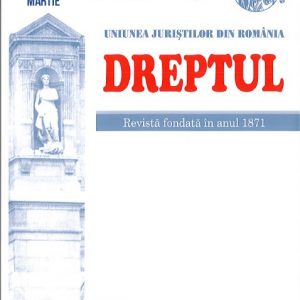 Continuous development of types of non-custodial sanctions as ways of combating crime, reducing the damage caused by it, avoiding the negative effects of deprivation of liberty, increasing the possibilities of executing these alternatives to the imprisonment and, last but not least, by reducing of detention costs have guided European Union Member States to create and introduce the most appropriate Community sanctions and measures to respond to these desires. The successful introduction of alternatives requires credibility, support of the public who must abandon the prejudice that a more relaxed criminal policy with less severe punishments encourages criminality, or that public humiliation or intrusive tracking of the persons undergoing penalties is permissible, and even necessary, to highlight the status by the offender. Equally, the successful introduction of alternatives1 depends on the judiciary that can not hesitate to make them available on a large scale whether is possible, but also on the involvement of many agencies (probation service, the bodies of the Ministry of the Interior, local authorities, etc.) to implement non-custodial sanctions.
Continuous development of types of non-custodial sanctions as ways of combating crime, reducing the damage caused by it, avoiding the negative effects of deprivation of liberty, increasing the possibilities of executing these alternatives to the imprisonment and, last but not least, by reducing of detention costs have guided European Union Member States to create and introduce the most appropriate Community sanctions and measures to respond to these desires. The successful introduction of alternatives requires credibility, support of the public who must abandon the prejudice that a more relaxed criminal policy with less severe punishments encourages criminality, or that public humiliation or intrusive tracking of the persons undergoing penalties is permissible, and even necessary, to highlight the status by the offender. Equally, the successful introduction of alternatives1 depends on the judiciary that can not hesitate to make them available on a large scale whether is possible, but also on the involvement of many agencies (probation service, the bodies of the Ministry of the Interior, local authorities, etc.) to implement non-custodial sanctions. -
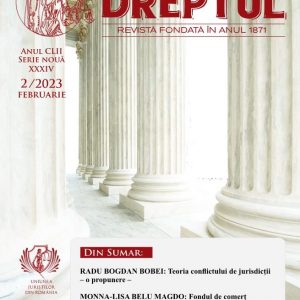
-
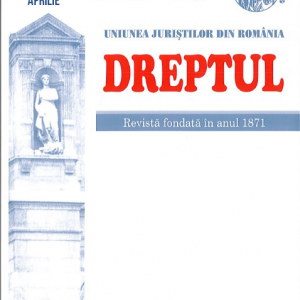 In this study, the author makes a thorough analysis of the current regime of private land movement in Romania in the light of the regulations contained in the new Romanian Civil Code (entered into force on 1 October 2011), as well as in other normative acts in force, but adopted earlier (the Forestry Code - Law no. 46/2008, Law no. 50/1991 on the authorization of construction works republished on 13 October 2004, Law no. 350/2001 on spatial planning and urban planning; Law no. 315/2005 on the acquisition of private property rights by foreign and stateless citizens and foreign legal persons; Law no. 71/2011 for the implementation of the new Civil Code. Essentially, the author believes that, although, partially, the new Civil Code relating regulations do not always have a fundamentally (absolutely) new nature, they bring, however, significant changes.
In this study, the author makes a thorough analysis of the current regime of private land movement in Romania in the light of the regulations contained in the new Romanian Civil Code (entered into force on 1 October 2011), as well as in other normative acts in force, but adopted earlier (the Forestry Code - Law no. 46/2008, Law no. 50/1991 on the authorization of construction works republished on 13 October 2004, Law no. 350/2001 on spatial planning and urban planning; Law no. 315/2005 on the acquisition of private property rights by foreign and stateless citizens and foreign legal persons; Law no. 71/2011 for the implementation of the new Civil Code. Essentially, the author believes that, although, partially, the new Civil Code relating regulations do not always have a fundamentally (absolutely) new nature, they bring, however, significant changes. -
 The cases examined in this study were generated by a recent decision of the Bucharest Court of Appeal. In essence, the author considers legally admissible the conclusion of agreements between the employer and the trade union, outside the formal framework established by Law no. 130/1996 regarding the collective labor agreement, but only subject to complying with certain limits, which he presents.
The cases examined in this study were generated by a recent decision of the Bucharest Court of Appeal. In essence, the author considers legally admissible the conclusion of agreements between the employer and the trade union, outside the formal framework established by Law no. 130/1996 regarding the collective labor agreement, but only subject to complying with certain limits, which he presents. -
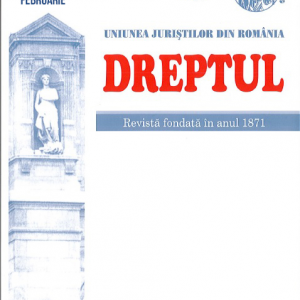 On 24 May 2018, the Parliament of the Republic of Moldova adopted the Law of RM No 85/2018 „For amending and supplementing the Labour Code of the Republic of Moldova No 154/2003”, aimed at adjusting the national legislation to Council Directive 98/59/EC of 20 July 1998 on the approximation of the laws of the Member States relating to collective redundancies. Thanks to these additions, operated in the Labour Code of the Republic of Moldova (hereinafter – the CM of RM), the Moldavian legislator has expressly enshrined the institution of collective redundancy. The present study aims at the multi-faceted elucidation of the legal regime of collective redundancy in the light of national legislation, of the European standards, as well as of doctrinal opinions. The identification and configuration of the circumstances and of the data underlying this research helped the authors of the study to scientifically elucidate the concept of collective redundancy and to determine the general procedure for its accomplishment.
On 24 May 2018, the Parliament of the Republic of Moldova adopted the Law of RM No 85/2018 „For amending and supplementing the Labour Code of the Republic of Moldova No 154/2003”, aimed at adjusting the national legislation to Council Directive 98/59/EC of 20 July 1998 on the approximation of the laws of the Member States relating to collective redundancies. Thanks to these additions, operated in the Labour Code of the Republic of Moldova (hereinafter – the CM of RM), the Moldavian legislator has expressly enshrined the institution of collective redundancy. The present study aims at the multi-faceted elucidation of the legal regime of collective redundancy in the light of national legislation, of the European standards, as well as of doctrinal opinions. The identification and configuration of the circumstances and of the data underlying this research helped the authors of the study to scientifically elucidate the concept of collective redundancy and to determine the general procedure for its accomplishment. -
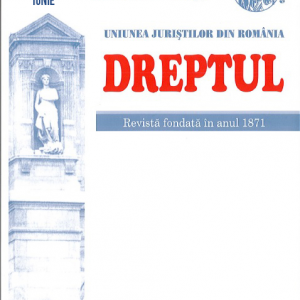 Along with punishments and educational measures, safety measures are part of the broad criminal sanctions category; however, the latter have a mostly preventive purpose, which is to prevent committing new crimes or other offenses provided by the criminal law. Special confiscation is a safety measure whose legal content is patrimonial, as it concerns certain assets related either to the committed deed or to the offender and which, if further left within the factual and legal circuit, could be used to commit new offenses provided by the criminal law. The mainly preventive aim of the special confiscation safety measure is achieved by the fact that, under the conditions and within the limits prescribed by law, property shall pass free of charge into State ownership so that any person may no longer possess or use them to commit other offenses provided by the criminal law.
Along with punishments and educational measures, safety measures are part of the broad criminal sanctions category; however, the latter have a mostly preventive purpose, which is to prevent committing new crimes or other offenses provided by the criminal law. Special confiscation is a safety measure whose legal content is patrimonial, as it concerns certain assets related either to the committed deed or to the offender and which, if further left within the factual and legal circuit, could be used to commit new offenses provided by the criminal law. The mainly preventive aim of the special confiscation safety measure is achieved by the fact that, under the conditions and within the limits prescribed by law, property shall pass free of charge into State ownership so that any person may no longer possess or use them to commit other offenses provided by the criminal law.
